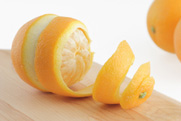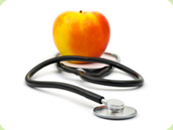

|
Though organic produce is becoming more widely available, it is frequently much more expensive. There's no question produce grown without pesticides is better for your health (and the environment), but affordability is another matter. So if you, like most people, are unable to choose organic foods all the time, here is a tip to maximize your investment:
Most of the pesticide residue (about 80%) in the fruit/vegetable is stored in the peel/rind. So fruits and veggies which will be peeled or skinned before consumption (like bananas, oranges, kiwi, kohlrabi, onions, potatoes, etc.) will lose most of their pesticide residue in the process and needn’t be purchased organic. Those that will not be peeled should be purchased organic as much as possible (like strawberries, blueberries, raspberries, lettuce, etc.).

Please know that even if you can’t afford any organic produce and can only purchase conventional, you should still eat as much as possible – the pesticide traces are far outweighed by the benefits of eating lots of fruits and veggies.
Special note for pregnant women: Because pregnant women do pass the pesticide residues to their developing offspring, this is a time when it is most vital to eat as organically as possible.
|




